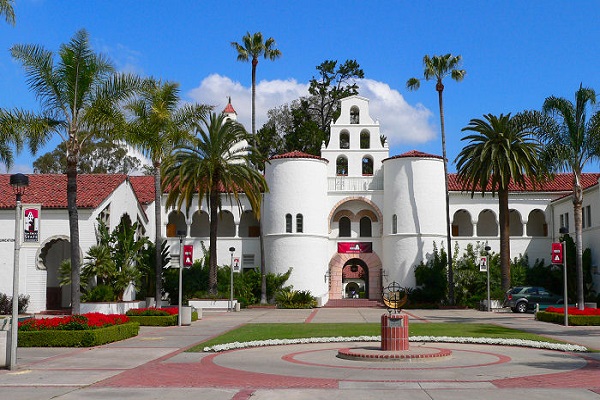San Diego State University: New Minor Addresses Influence of Sports on Society
A new interdisciplinary sports and society minor at San Diego State University helps students explore the interplay of leisure, exercise, and recreation with culture, history, and community identities.
“With this 15-unit minor, students will explore what role gender and racial equality play in sports,” said David Kamper, adviser for the College of Arts and Letters minor. “They will learn about historical roles of sports in the development of national identity, and how the massive influx of money into sports affects the way people experience play and games.”
Sports in American History (HIST-114) serves as a requisite introductory course. “The goal is to look at American history, from Indigenous cultures to the present, through the lens of sports, with a focus on race, gender, and power,” said history professor David Cline. “We also look at many other aspects of American society, including economics, class, access, gambling, (and) community building.”
In Kamper’s Culture, Gender, and Race in Sports (ANTH-445) course, students learn of the lenses that help them navigate the dynamics of race, class, gender, ability, sexuality, ethnicity, and nationality that impact sports today.
Daniel Rolf, a fourth-year transfer student, found Kamper’s course a great supplement to his coursework. As an experienced baseball player, sports hold a special place in his life.
Rolf said Kamper’s course helped expand his perspective on sports from its friendships and life lessons to its politics, history and importance in today’s landscape.
“As a sports fan, I always thought sport was a very neutral space, but professor Kamper made it clear in several lectures that sport is not neutral. Sport is often used to push a certain side of politics,” he said. “Much like the study of anthropology, it woke me up to the underpinnings of sport and … you can see how politics really influences the economic side.”
Global perspectives
Another required course, Sports and Race (CCS-275), is taught by Michael Domínguez, professor of Chicana and Chicano Studies, who said “My hope is that students will discover new racial literacies, or ways to see, talk about, and understand race, ethnicity, and culture in everyday life.”
In this course, students may discover “how complicated, messy, problematic, exciting, and meaningful sports can be, and how that experience with sport is really shaped by our racial identities and lived experiences.”
Toby Burack, a third-year political science major with a minor in honors interdisciplinary studies said, “Professor Domínguez’s Sports and Race course exposed me to a variety of new ways of thinking about the intersection between the many elements of sport and the social categorization of humans based on phenotype. Overall, this has been one of the most enriching courses I have taken at SDSU because of the material covered and the way in which it was presented to me (through readings, documentaries, and group projects).”
Sport in Brazilian Society (BRAZ-455), an elective course to be offered in spring 2023, examines the role that sports play in Brazilian society as well as how the issues and politics of sports ripple into other seemingly unrelated parts of the social world.
Kristal Bivona, assistant director of the Behner Stiefel Center for Brazilian Studies thinks students may be surprised by the diversity of course material drawn from the humanities and the social sciences.
“I hope that students discover that sport in Brazil is much more than a pastime, but that the study of sport can be a gateway to consider political and diplomatic controversies and to examine pressing contemporary issues, such as racism, gender-based discrimination, social exclusion, and classism,” Bivona said.
Meaningful experiences
Jess Ponting, a lifelong surfer and associate professor in the L. Robert Payne School of Hospitality and Tourism Management, teaches Wellness and Recreation for Life Through Surfing (RTM-102).
“The class is really about prioritizing recreation, fun, and ‘stoke’ as a way to increase well-being throughout one’s life,” Ponting said. “I get to make the case backed with science and theory in the context of surfing, sharing the stories of some of surfing’s most inspiring characters and harking back to ancient surfing cultures.”
For students studying kinesiology programs, the minor provides a meaningful extension of their learning to make them competitive in an ever-changing sports-related career market.
One course, taught by two-time Ironman World Champion Scott Tinley, is Sport, Games, and Culture (ENS-318) an upper-division elective for students from any major housed in the School of Exercise and Nutritional Sciences.
“There are students who are very interested in the world of sport, from a variety of perspectives,” Tinley said. “Many aren’t sure whether they want to be a physiologist, sports therapist, or a sports manager. This minor offers them a vehicle to explore the territory.”

